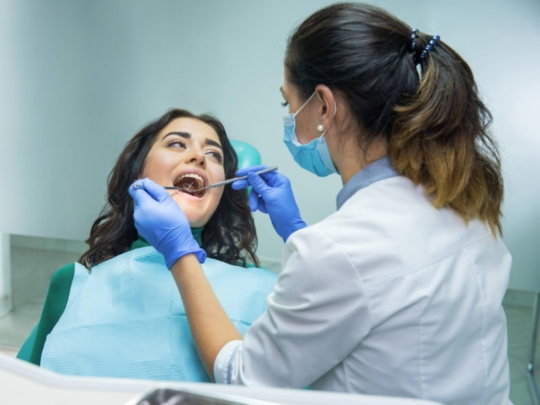
Why Oral Health Matters
Oral health goes beyond the surface. The mouth is the gateway to the body, and what happens there can affect the rest of your health.
Poor oral hygiene can lead to gum disease, tooth decay, and even more severe conditions like heart disease and diabetes. Maintaining good oral health helps prevent these issues and contributes to your overall health and quality of life.
The Basics of Oral Hygiene
Before diving into age-specific tips, let’s cover the basics of oral hygiene that apply to everyone:
1. Brush Twice Daily
Brushing your teeth twice a day is essential. Use fluoride toothpaste and a soft-bristled toothbrush to remove plaque and food particles. Brushing helps prevent cavities and gum disease by keeping your mouth clean and fresh.
2. Floss Daily
Flossing is just as important as brushing. It removes food particles and plaque between the teeth where a toothbrush can’t reach. Regular flossing helps prevent gum disease and tooth decay.
3. Use Mouthwash
Mouthwash can help reduce the amount of acid in the mouth, clean hard-to-brush areas, and re-mineralize the teeth. Look for a mouthwash that contains fluoride and is designed to fight against cavities and gum disease.
4. Maintain a Healthy Diet
What you eat affects your oral health. Limit sugary snacks and drinks, as they contribute to tooth decay. Eat a balanced diet rich in fruits, vegetables, and dairy products to promote strong teeth and gums.
5. Regular Dental Check-Ups
Visiting your dentist regularly for cleanings and exams is crucial. Your dentist can detect early signs of issues before they become serious. Aim for at least two dental check-ups per year.
Oral Health Tips for Children
Starting good oral health habits early is vital for a lifetime of healthy teeth and gums. Children are especially prone to cavities, so instilling proper oral care routines is essential.
1. Begin Early
Start cleaning your child’s gums with a soft, damp cloth even before their first teeth come in. Once the teeth emerge, use a small, soft-bristled toothbrush.
2. Monitor Fluoride Intake
Fluoride strengthens teeth and helps prevent cavities. Use a pea-sized amount of fluoride toothpaste for children aged 3 to 6. Ensure they don’t swallow toothpaste, as excessive fluoride can cause fluorosis, leading to discoloration of the teeth.
3. Limit Sugary Snacks
Children often crave sugary snacks, but these can lead to cavities. Offer healthier alternatives like fruits, cheese, and yogurt, which promote strong teeth.
4. Regular Dental Visits
Schedule your child’s first dental visit by their first birthday. Early dental check-ups help catch any potential issues and get your child accustomed to visiting the dentist.
Oral Health Tips for Teenagers
Teenagers face unique oral health challenges, including orthodontic care and an increased risk of cavities and gum disease due to hormonal changes.
1. Continue Brushing and Flossing
It’s easy for teenagers to skip brushing and flossing due to busy schedules, but maintaining these habits is crucial during these years. Encourage them to brush after meals and floss daily.
2. Protect Teeth During Sports
If your teen plays contact sports, make sure they wear a mouthguard to protect their teeth from injury.
3. Limit Sugary Drinks
Teenagers often consume sugary drinks like soda and energy drinks, which can erode enamel and cause cavities. Encourage water or milk as healthier alternatives.
4. Monitor Orthodontic Care
If your teen has braces or other orthodontic appliances, ensure they maintain good oral hygiene. Brushing and flossing around braces can be challenging, so consider special tools like floss threaders and interdental brushes.
Oral Health Tips for Adults
As adults, maintaining oral health involves more than just preventing cavities. Gum disease becomes a significant concern, and other health conditions can impact oral health.
1. Address Gum Disease Early
Gum disease, or periodontal disease, is common among adults and can lead to tooth loss if untreated. Watch for signs like bleeding gums, bad breath, and receding gums, and consult your dentist if you notice any of these symptoms.
2. Stay Hydrated
Dry mouth can be a problem for adults, especially those taking certain medications. Drink plenty of water and chew sugar-free gum to stimulate saliva production, which helps protect your teeth from decay.
3. Avoid Tobacco Products
Smoking and using other tobacco products significantly increase the risk of gum disease and oral cancer. Quitting tobacco is one of the best things you can do for your oral and overall health.
4. Regular Dental Check-Ups
Continue visiting your dentist regularly, even if you don’t have any noticeable issues. Routine exams can catch problems early, making them easier to treat.
Oral Health Tips for Seniors
Oral health needs change with age. Seniors may face challenges such as tooth loss, dry mouth, and an increased risk of oral cancer.
1. Keep Up with Dental Care
Even if you have dentures, maintaining regular dental check-ups is crucial. Your dentist can check the fit of your dentures and screen for oral cancer.
2. Manage Dry Mouth
Dry mouth is common in seniors, especially those on medication. It can lead to an increased risk of cavities and gum disease. Stay hydrated, use saliva substitutes, and avoid alcohol-based mouthwashes.
3. Consider Dental Implants
If you’ve lost teeth, dental implants can be a more permanent and comfortable alternative to dentures. They help maintain jawbone structure and prevent further tooth loss.
4. Pay Attention to Changes
As you age, be vigilant about changes in your oral health. Any sores, lumps, or changes in how your dentures fit should be checked by a dentist, as they could be signs of oral cancer.
Conclusion
Maintaining oral health is a lifelong commitment that pays off in numerous ways. No matter your age, taking steps to care for your teeth and gums can prevent a range of health issues and improve your quality of life. By following these tips and working closely with your dentist, you can enjoy a healthy, beautiful smile at any stage of life.







